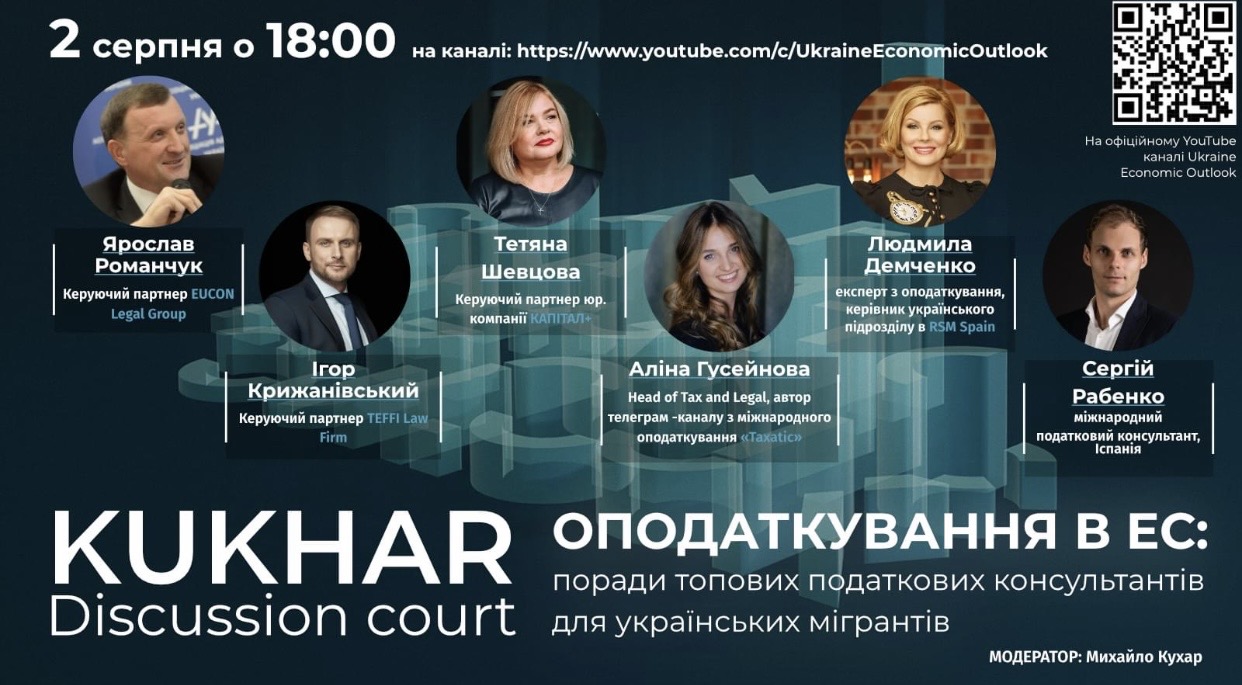
On 2 July, a live broadcast of the KUKHAR Discussion Court took place on the topic “Taxation in the EU: Advice from top tax advisors to Ukrainian migrants” as part of the Ukraine Economic Outlook initiative. Leading Ukrainian tax lawyers provided live advice to the audience on the tax residency of Ukrainian migrants abroad. The meeting was moderated by Mykhailo Kukhar, lecturer of the core macroeconomics course of the ‘Business School MIM-Kyiv’ and senior economist of Ukraine Economic Outlook.
Yaroslav Romanchuk, lawyer and managing partner of EUCON Legal Group, being a speaker within the framework of the event, focused during the broadcast on the taxation of income of Ukrainian citizens residing abroad through the prism of the practical experience of the tax practice team of the EUCON Warsaw office.
Responding to questions about the statuses Ukrainian migrants can obtain in Poland, Yaroslav Romanchuk pointed out that currently displaced persons can legalise their stay in Poland in two ways: by obtaining refugee status or temporary protection.
In the context of the topic of the tax residence of Ukrainian migrants in the Republic of Poland, it is important to clarify the explanation of the Polish Ministry of Finance’s response that Ukrainians are allowed not to pay taxes in Poland. Mr. Yaroslav pointed out that, despite the wave of debates, it is still necessary to consider this issue constructively and comprehensively: for example, in Poland there is a law “On Personal Income Tax”, which clearly defines tax residency, so there are two criteria according to which a person is considered a tax resident of Poland: 1) the person has a centre of personal (life) and economic interests in Poland; 2) the person stays in Poland for more than 183 days. The speaker emphasised that if one of the above residency conditions is met, but at the same time Ukraine treats a person as its tax resident, one should use the double taxation convention adopted between the governments of Ukraine and Poland, which explicitly lists the conditions allowing for a specific determination of residency. In addition, the expert stressed that the letter issued by the Ministry of Finance does not have the force of law and has no reference to the sources of legislation, so it follows that Ukrainians who stay in Poland for more than 183 days have in fact become tax residents of Poland. But whether a person already has to declare funds in Poland is an open question, as each case needs to be considered individually. Regarding the declaration of funds with which Ukrainians came to Poland, Romanchuk pointed out that if this amount does not exceed $10000, there should be no problems with the declaration.
Equally important is Yaroslav Romanchuk’s comment on shattering myths that if a Ukrainian citizen officially works and pays taxes in Poland, he or she may not pay anything in Ukraine when applying the double taxation agreement. The expert explained that firstly, there is a difference between the tax rates of the two countries, and secondly, there is a significant difference in terms of the tax base. In addition, there is a clear norm in each country to declare funds that have a foreign source, although in Ukraine this issue is quite problematic. According to the speaker, the situation will also be affected by the deadline for declaring hidden income under the Law of Ukraine “On Tax Amnesty” and the entry into force in Ukraine from 1 January 2023 of the terms of the World CRS Forum on the exchange of tax information.
Yaroslav Romanchuk, given his years of experience in the Polish market, gave practical advice on topping up and maintaining accounts in European banks, looking at the specifics of opening an account in Poland and the process of confirming the origin of income for banks. “When coming to a bank, a person needs to have a ‘correct’, true legend, so this should not be neglected”. – stressed the lawyer.
Finally, the managing partner of EUCON advised the audience when dealing with European banks: 1) collect documents and prepare relevant legends, and not to use the Ukrainian practice (in particular card-to-card transfers); 2) seek and cooperate with Polish tax advisors; 3) avoid aggressive tax planning. On legislation, Yaroslav Romanchuk said that there is an urgent need to amend the Law of Ukraine “On Currency and Currency Operations” in the context that Ukrainian sole proprietors can only open accounts in Ukrainian banks. In addition, there is a need to prepare a law “On total amnesty” for the future, as in fact all Ukrainian displaced persons residing in Poland for more than 183 days violate Ukrainian tax laws. At the end of his speech, the speaker stressed that citizens should be prepared to work closely with the tax authorities in the future.